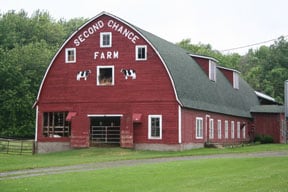Expect Change: Why and How to Help Your Employees Adjust
by Anita Deming
When I first started at Cornell Cooperative Extension in January of 1978, the first meeting I went to on a State level was about how important it was to change extension to become more responsive to our clientele. Since I was new to extension, I thought what a great idea; this meant everyone else had to change except me. Now I am among the “old” guard, and something that I have learned about change is that it happens. In fact, change is happening even faster than ever before. Just when I learn something, it changes. (Periodically, I have to remind my daughter that I went to college with a slide rule, as she chides me on not being up to speed with the new computer programs.)
A few years ago I read a book by Ken Blanchard on change called, “Who Moved My Cheese?” It uses a metaphor of a mouse in a maze that learned one path to the cheese and then the cheese was moved. At first the mouse was very confused, but eventually it walked around and found some cheese in another place. After a couple of times the mouse learned very quickly to look for the cheese in a new place and less time was lost before the new cheese was found. If the cheese was totally removed, the mouse would look for a while before giving up.
What did Blanchard infer from this exercise about change and motivating people?
- “Change Happens = they keep moving the cheese
- Anticipate Change = get ready for the cheese to move
- Monitor Change = smell the cheese often so you know when it is getting old
- Adapt to Change Quickly = the sooner you let go of the old cheese the sooner you can enjoy the new cheese
- Change = move with the cheese
- Enjoy Change = savor the adventure and the taste of the new cheese
- Be Ready to Quickly Change Again and Again = they keep moving the cheese.”
What have I learned about change over the years? I am not as afraid of change as I used to be. I used to fear that I would not be the “best” in new situations. However, I have found that learning new things is fun, challenging, and sometimes rewarding. In fact, I am not likely to be the “best” if I don’t change. I have also learned that not all change is good, but worrying about it is not productive either. Better to find out if it works and if not, change again to something that does work.
Several studies on change and employee motivation have shown that change can demoralize people who do not understand or support the need for change, or who do not understand where their rewards come from. Studies show that some employees remain motivated and happy by including them in the planning for change and decision making on alternatives. Other studies show that participation in decision making is not wanted by some employees. It seems that different employees react differently to involvement. Which type of employee would you like to hire? One who wants to evolve with the business and help develop positive changes in your business or one who does not want to be involve (“Just tell me what to do. I don’t care”)?
3 Tips for Helping Your Employees Deal with Change
• The first thing you learn as an employer is that it is impossible to motivate someone that is not already self-motivated. Hiring the right personality is often more important than their present knowledge of facts.
- The next crucial thing is for your employees to understand and support the mission of your business, e.g., do they believe that it is important to feed the world cheese? Do they want to be a part of making that cheese?
- Finally, employees need to know the factors upon which they are being judged and have some control over those factors in order to perform at their best. For example, as the process of “making the cheese” changes, are your employees rewarded for adjusting their schedule and work load to accommodate the change? Do they have feedback on the success of the new cheese making process or ideas to make it better?
“Cheese” for Thought
• “It is not necessary to change. Survival is not mandatory either.” — W. Edwards Deming
• “Insanity: doing the same thing over and over again and expecting different results.” — Albert Einstein
• “Change means movement. Movement means friction. Only in the frictionless vacuum of a nonexistent abstract world can movement or change occur without that abrasive friction of conflict.” — Saul Alinsky
• “Progress is a nice word. But change is its motivator. And change has its enemies.” — Robert F. Kennedy
• “Change is inevitable – except from a vending machine.” — Robert C. Gallagher
As the leader of a mission-based organization, I sometimes feel that my primary role is to listen to staff and volunteers for ideas about needed changes. Often they will identify problems first and have the best ideas for fixing them. My job is to find out how to pay for changes and how to implement them to better meet our mission to help our farmers, citizens, and communities locally and across New York State.
Anita Deming is Executive Director with Cornell Cooperative Extension of Essex County, and has been an agricultural educator for more than 30 years. She founded the Adirondack Harvest project with many local farmers and interested in consumers in July 2004. Anita can be reached at 518-962-4810 x409, ald6@cornell.edu
For more information on agriculture in Northern New York, visit the Cornell Cooperative Extension of Northern New York website at www.ccenny.com and www.nnyagdev.org. Cornell Cooperative Extension provides equal program and employment opportunities.


